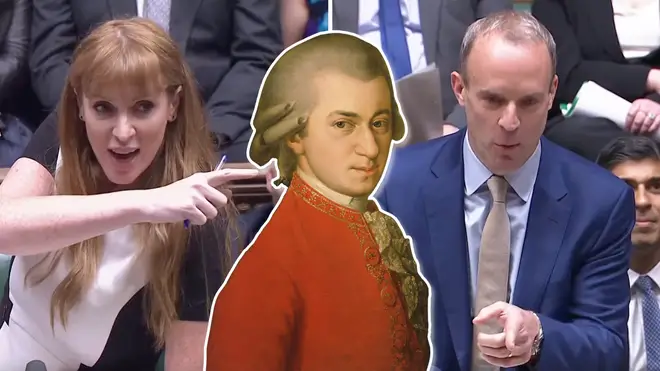On Air Now
Classic FM Breakfast with Dan Walker 6:30am - 9am
30 June 2022, 14:56 | Updated: 6 July 2022, 20:27

The latest political row between the Conservative and Labour parties is about... a Mozart opera.
A Mozartian operatic storm engulfed Westminster yesterday, where the UK’s capital has become an unlikely place for a debate on opera, Mozart, and access to the arts.
On 24 June, British newspaper The Telegraph shared an exclusive that contained a photo of UK Labour Party’s deputy leader Angela Rayner, relaxing with a glass champagne before a performance of Mozart’s opera The Marriage of Figaro at the Glyndebourne Festival opera house in the Sussex countryside.
Read more: The UK’s best cheap orchestra and opera tickets for young audiences
In his piece, The Telegraph’s associate political editor Christopher Hope made the point this this was on the same day as the UK was being crippled by train strikes instigated by the RMT Union. Rayner, who is proud of her working-class roots, was a trade union representative for Unison, before being elected to parliament.
And it’s led Mozart to be drawn into a political and cultural conflict across party lines.

Yesterday, Rayner faced deputy prime minister Dominic Raab in Prime Minister’s Questions (PMQs), a weekly parliamentary exchange between leaders of Westminster’s two major parties.
Raab took delight in saying how, whilst the country grappled with a major strike and confrontation over rail worker wages, Rayner had chosen Mozart opera over picket lines.
“She talks about working people, where was the right honourable lady when the comrades were on the picket line last Thursday? She was at the Glyndebourne music festival sipping champagne [and] listening to opera,” he said at yesterday’s PMQs.
Directly after the session, Rayner responded to the Deputy Prime Minister’s operatic jibe saying: “My advice to the Deputy PM is to cut out the snobbery and brush up on his opera. The Marriage of Figaro is the story of a working-class woman who gets the better of a privileged but dim-witted villain.”
She went on to say: “Judging by his own performance today, Dominic Raab could learn a lesson about opening up the arts to everyone, whatever their background.”
While political commentators scored the Prime Minister’s Questions and subsequent statements differently, many on Twitter applauded Rayner’s response – some simply replying with Obama ‘mic drop’ gifs.
Dominic Raab won’t approve but I did indeed go the opera last week (it cost me £62).
— Angela Rayner 🌹 (@AngelaRayner) June 29, 2022
Tom Eisner, a working-class lad from Buxton near where I grew up kindly invited me. He’s been playing violin at Glyndebourne for 36 years.
Never let anyone tell you you’re not good enough. 🎻 pic.twitter.com/7XE0GHBRPQ
The political pages are not the usual places for debates about classical music, opera and accessibility. However, many have seen it as an opportunity to highlight that opera is not just something for privileged classes. Composer Howard Goodall added his voice to the conversation, saying “Mozart would have loved to see Angela Rayner there”.
The Marriage of Figaro, based on a play banned in the Austrian Empire where the opera was 1st performed, was a deliberate satire on an out-of-touch ruling class, bullies & sexual predators of the people who worked for them. Mozart would have loved to see @AngelaRayner there.
— Howard Goodall (@Howard_Goodall) June 25, 2022
Glyndebourne Festival runs from May to August every year. 2022 features operas by Mozart alongside Puccini, Donizetti, Ethel Smyth and more. You can get tickets for as little as £15. Their a very popular membership scheme for under-30s offers £30 tickets to the Festival.
Rayner herself highlighted that her ticket cost £62.
Mozart’s Marriage of Figaro is a story of class subversion where a young couple attempt to outwit their aristocratic employer with farcical consequences. It was premiered in Vienna in May 1786 and has long been regarded as a piece of cultural satire alongside its beautiful music.
We’re sure Mozart would have been delighted to know that, 236 years later, his operatic masterpiece was still leading conversions, challenging convention and being talked about as much as ever.